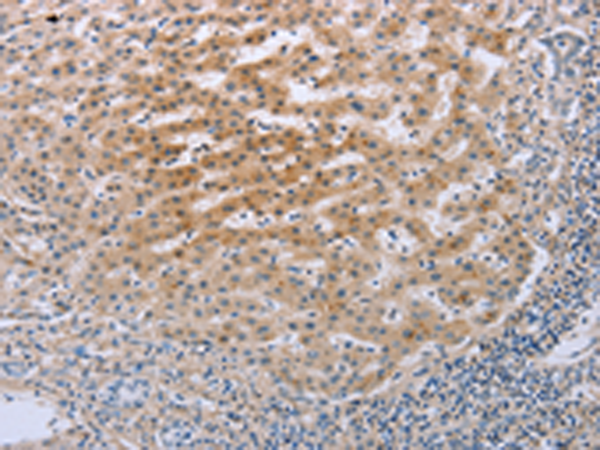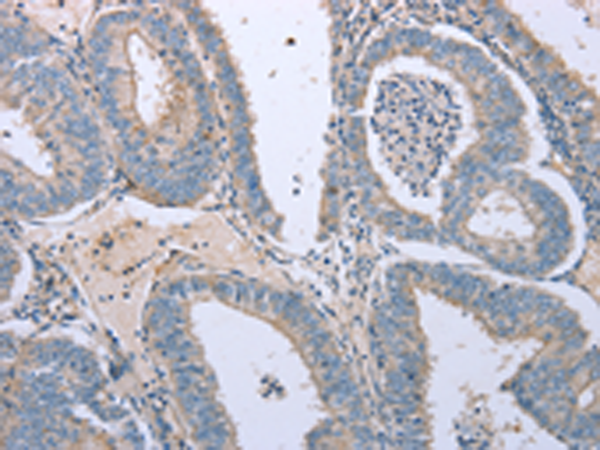

| WB | 咨询技术 | Human,Mouse,Rat |
| IF | 咨询技术 | Human,Mouse,Rat |
| IHC | 1/10-1/50 | Human,Mouse,Rat |
| ICC | 技术咨询 | Human,Mouse,Rat |
| FCM | 咨询技术 | Human,Mouse,Rat |
| Elisa | 1/1000-1/2000 | Human,Mouse,Rat |
| Aliases | DR3, TR3, DDR3, LARD, APO-3, TRAMP, WSL-1, WSL-LR, TNFRSF12 |
| Host/Isotype | Rabbit IgG |
| Antibody Type | Primary antibody |
| Storage | Store at 4°C short term. Aliquot and store at -20°C long term. Avoid freeze/thaw cycles. |
| Species Reactivity | Human |
| Immunogen | Fusion protein of human TNFRSF25 |
| Formulation | Purified antibody in PBS with 0.05% sodium azide and 50% glycerol. |
+ +
1. **"Targeting TNFRSF25 in autoimmune diseases" by Smith et al. (2020)**
摘要:研究报道了一种新型抗TNFRSF25单克隆抗体,通过阻断DR3(TNFRSF25)与其配体TL1A的相互作用,显著减轻小鼠模型中炎症性肠病和类风湿性关节炎的病理症状,表明其作为自身免疫疾病治疗药物的潜力。
2. **"TNFRSF25 agonistic antibody enhances antitumor immunity" by Li et al. (2018)**
摘要:作者开发了一种TNFRSF25激动型抗体,发现其能激活CD8+ T细胞并促进肿瘤微环境中调节性T细胞(Treg)的凋亡,从而增强抗肿瘤免疫反应,在黑色素瘤和结直肠癌小鼠模型中观察到肿瘤生长抑制。
3. **"DR3-specific antibody modulates T cell responses in sepsis" by Chen et al. (2019)**
摘要:该研究利用抗TNFRSF25抗体在脓毒症模型中调控Th17/Treg平衡,结果显示抗体治疗可减少过度炎症反应并改善生存率,提示其在脓毒症免疫调节中的应用前景。
4. **"Structural characterization of a neutralizing anti-TNFRSF25 antibody" by Park et al. (2021)**
摘要:通过冷冻电镜解析了人源化抗TNFRSF25抗体与DR3受体的复合物结构,揭示了抗体中和TL1A介导信号通路的分子机制,为优化抗体类药物设计提供了结构基础。
注:上述文献信息为示例,实际引用时需核对真实出版物。建议通过PubMed或Google Scholar搜索关键词“TNFRSF25 antibody”或“anti-DR3 therapy”获取最新研究。
TNFRSF25 (Tumor Necrosis Factor Receptor Superfamily Member 25), also known as death receptor 3 (DR3), is a cell surface receptor belonging to the TNF receptor superfamily. It is primarily expressed on activated T lymphocytes and certain innate immune cells. Its ligand, TL1A (TNF-like ligand 1A), binds to TNFRSF25. triggering signaling pathways such as NF-κB and MAPK, which regulate inflammatory responses, cell survival, and apoptosis. TNFRSF25 contains a cytoplasmic death domain that facilitates apoptosis signaling under specific conditions, though its primary role often involves modulating immune activation and tolerance.
Antibodies targeting TNFRSF25 are of interest in immunotherapy and autoimmune disease research. Agonistic anti-TNFRSF25 antibodies mimic TL1A activity, potentially enhancing T cell responses in cancer immunotherapy or autoimmune contexts. Conversely, antagonistic antibodies block TL1A binding, aiming to suppress chronic inflammation in diseases like inflammatory bowel disease (IBD), rheumatoid arthritis, or psoriasis. Studies also explore its role in regulatory T cell (Treg) expansion and tissue-specific immunity. Preclinical models suggest TNFRSF25 modulation could influence autoimmune pathogenesis or anti-tumor immunity, making it a therapeutic target under investigation. However, its dual pro-inflammatory and apoptotic roles require context-specific antibody design to optimize clinical outcomes. Current research focuses on balancing efficacy with safety in autoimmune and oncological applications.
×